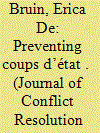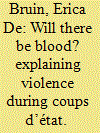| Srl | Item |
| 1 |
ID:
160785


|
|
|
|
|
| Summary/Abstract |
Although coups remain a pressing concern for rulers across the globe, the mechanisms through which common coup-prevention strategies operate have not been well theorized or rigorously tested. This article analyzes how “counterbalancing” the military with other security forces prevents coups. Using new cross-national time-series data on state security forces along with evidence from sixteen case studies, the article demonstrates that counterbalancing reduces the likelihood that coup attempts will succeed and that it does so primarily by creating incentives for some soldiers to resist the coup, rather than by creating barriers to coordination between forces. However, counterbalancing is not associated with fewer coup attempts. In fact, the creation of a new security force increases the odds of a coup attempt in the following year. These findings highlight potential costs associated with counterbalancing and explain why it is not more widespread.
|
|
|
|
|
|
|
|
|
|
|
|
|
|
|
|
| 2 |
ID:
186599


|
|
|
|
|
| Summary/Abstract |
Vietnam is a key player in India’s Act East Policy and is distressed due to China’s overarching position in the South China Sea. China’s expanding infrastructural investments in India’s periphery have led to a regional security dilemma in Indian Ocean Region. India is steered to pursue opportunities to counter China in the latter’s periphery, to which Vietnam fits as an apt ally. Hence, this paper examines the heightened need for realigning India’s Vietnam policy in line with United Nations Sustainable Development Goals and explains how bilateral cooperation through sustainable trade, renewable energy production, and green investments can offer a “counter” to Chinese expansion in Indo-Pacific and its Belt and Road Initiative. This paper uses the theoretical framework of Balance of Power to enumerate how geostrategic policy decisions in India-Vietnam bilateral relations can create a “counterbalance” to the Chinese investments in India’s neighborhood, especially in Pakistan.
|
|
|
|
|
|
|
|
|
|
|
|
|
|
|
|
| 3 |
ID:
169000


|
|
|
|
|
| Summary/Abstract |
Although just under half of all coup d’état attempts involve fatalities, there has been surprisingly little attention to the conditions under which coups turn violent. Existing research emphasizes the incentives coup plotters have to avoid bloodshed but does not explain the conditions under which violence nonetheless occurs. This article develops a theoretical framework that predicts that the extent of violence that occurs during coup attempts will vary systematically with central features of incumbent regimes and coup plotters. It then tests these predictions using new data on the fatalities associated with 377 coup attempts between 1950 and 2017. Coups against military regimes are found to be less violent than those against civilian dictatorships. This is because military rulers are better able to estimate the likelihood of the coup succeeding and more sensitive to the costs associated with using violence to suppress a coup. Since their post-coup fates tend to be better than those of other authoritarian leaders, they also have fewer incentives to hang on to power at any cost. The analysis also demonstrates that coups led by senior officers involve less bloodshed than those by junior officers and enlisted men. However, coups against rulers that counterbalance their militaries are no more violent than those against rulers that do not. The results shed new light on the dynamics of coup attempts.
|
|
|
|
|
|
|
|
|
|
|
|
|
|
|
|